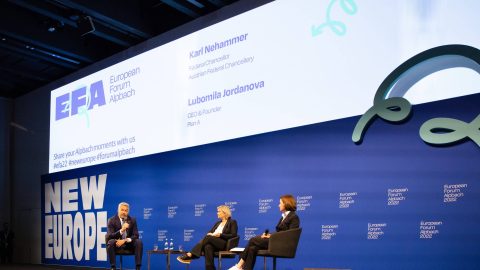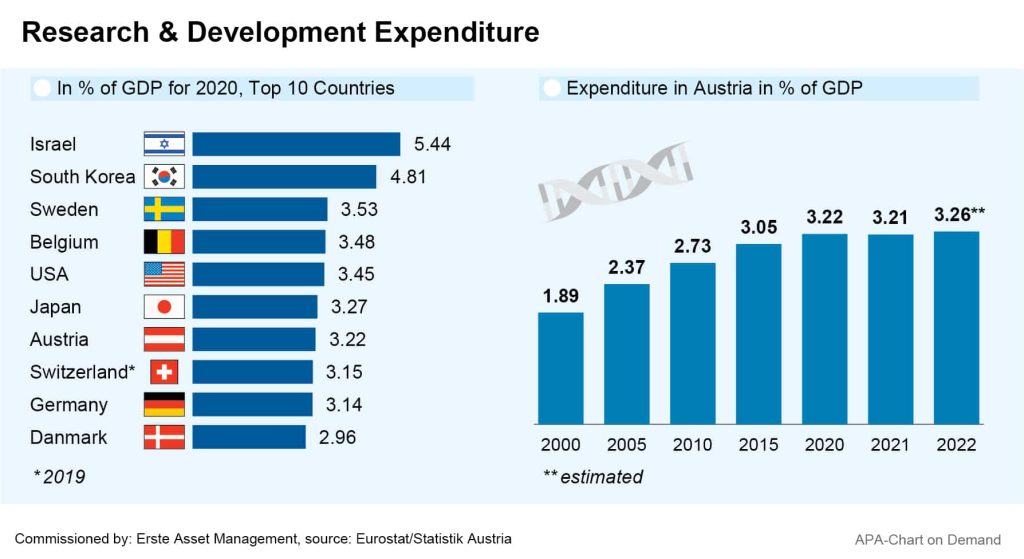The organisers of the European Forum Alpbach have drawn a positive conclusion after the symposium, held for the 77th time this year. Numerous top representatives from politics, business and science once again gathered in the Tyrolean mountain village to exchange views on the dominating issues such as environmental protection or security policy. Naturally, the war in Ukraine was also a central topic, with “The New Europe” declared the theme for this year’s Forum, which saw close to 3,800 attendees from roughly 100 nations.
From an organisational point of view, this year’s Forum featured a number of firsts. “We have succeeded in many things, we are on the right path vis-à-vis organisation,” summarised the President of the Forum, Andreas Treichl. For example, young people were involved more closely this year. Now and in the future, one imperative setting Alpbach apart remains “that we give the youth, our scholarship holders from Europe and from all over the world, the opportunity to meet with the greatest minds in politics, business, science, art, to be able to form an opinion about the real and genuine and big problems of Europe.”
The Forum’s cross-disciplinary orientation was also a new feature this year. The traditional series of talks on economics, law, health and politics seen in previous years were replaced by the overarching themes of “The Climate Oppportunity”, “Securing Europe’s Future in a Globalised World”, “The Financing of Europe’s Future” and “The Future of Democracy and the Rule of Law in Europe”.
Ukraine War Exacerbates Global Food Supply Problem
The dominant theme of this year’s conference was the war in Ukraine, with an emphasis on the consequences of the war on food supply. Although there is no need to worry about Europe itself, said Martin Frick, Director of the World Food Programme, this does not apply to other parts of the world.
The Ukraine war has become a global crisis accelerator, Frick said. Even before the Russian invasion, a good 275 million people in the world were at acute risk of hunger. Since then, this number has increased by another 70 million. Regions in the Middle East, in North Africa and inland Africa, but also in Latin America are affected. However, it is not the availability of food per se that is responsible, but rather a crisis of distribution. Food is simply not affordable for many people. Minister of Agriculture Norbert Totschnig stressed that Austria is trying to help at various levels, for example with grain transports provided by the ÖBB or support for the World Food Programme.
The microcredit programme set up by the Ministry of Labour and Economy together with Erste Bank is also helping. The programme, created in 2010, will be extended until 2025 and will also support Ukrainian refugees in the future. Going forward, refugees will be able to take advantage of microloans from Erste Bank to finance their rebuilding of their lives in Austria. Since its launch, the microcredit programme has already helped finance close to 1,000 business start-ups with a potential loan volume of more than EUR 10m.
Circular Economy Crucial for fighting Climate Change
Once again, climate protection was one of the Forum’s central themes, with the importance of recycling and circular economy being main topics. The times of a seemingly endless supply of raw materials are coming to an end in some places; meanwhile, people are inundated by mountains of waste in many places. Nevertheless, for Roland Pomberger of the University of Leoben, “waste is a scarce commodity”, as he explained in Alpbach. Austria would do well to recognise this and try harder to recycle raw materials in the sense of a circular economy, the expert said.
The idea that humanity’s handling of the Earth’s finite resources has to change as a whole is gaining traction. The idea of circular economy is to break down products into their components again at their end of use by the consumer in order to have starting materials or raw materials for further products available. For Pomberger, this already begins at development and production: if, for example, components of an appliance are glued together or six different types of screws are used, this is “not recyclable”.
For Jürgen Janger of the Institute for Economic Research (WIFO), circular economy is more than recycling. The idea should become more prevalent in all sectors. This also applies to research policy and funding. “Austria needs to think bigger,” said Janger. The prerequisites in order to be at the forefront of the topic in this country through more investments are substantial.
Experts Call for Greater Efforts in Innovation and Research
The demand for more research funding was also a prevalent theme in many other discussion rounds. The Austrian Research Promotion Agency (FFG), for example, wants to promote disruptive innovations with its own programme starting next year. As FFG Managing Director Henrietta Egerth explained in Alpbach, the FFG will apply for the funds amounting to EUR 15m from the Austrian Future Fund, which has made a total of EUR 145.96m available for the current year.
Disruptive, i.e. radical, innovation must arise of its own accord and cannot, of course, be decreed from above, said Egerth: “But what we want to do here is to accompany the ecosystem in which disruptive innovation can best arise more strongly and also support it more systematically.”
During the discussion, Minister of Economy Martin Kocher identified a “paradigm change as far as research is concerned”. Whereas 20 years ago innovation simply emerged, today there are also stronger strategic guidelines from the EU on the direction research should take. At the same time, in view of the Ukraine war and other crises, research and development could take on a stronger political component. Last but not least, the restructuring of the energy system in the direction of renewable energies requires disruptive technologies. He sees Austria well positioned, but facing major challenges.
Investor Hermann Hauser sees three “cicles of technology sovereignty” for the future: the USA, Europe and China. All the others, especially the United Kingdom, would have to decide which of these circles they wanted to belong to. Those who do not possess important technologies themselves or have access to them through independent states, will become dependent.
For complexity researcher Stefan Thurner, generating disruptive innovations does not require money alone, but rather the interaction of clever minds: “The question is, what is the critical mass for a region to become good? Talented people go where the best people are.” Small improvements in innovation and university rankings are not enough here, he said. “The best students don’t go to the university that is ranked 400th,” says Thurner.
For FFG Managing Director Egerth, too, much more needs to happen at university level regarding spin-offs and knowledge transfer. “The universities are still dragging their feet.” Only a few institutes continuously manage to set up spin-offs, and then often only thanks to individuals who do it “more as a hobby”. “We have to do more here and not linger in comfortable mediocrity,” said Egerth.
For a glossary of technical terms, please visit this link: Fund Glossary | Erste Asset Management
Legal note:
Prognoses are no reliable indicator for future performance.
Legal disclaimer
This document is an advertisement. Unless indicated otherwise, source: Erste Asset Management GmbH. The language of communication of the sales offices is German and the languages of communication of the Management Company also include English.
The prospectus for UCITS funds (including any amendments) is prepared and published in accordance with the provisions of the InvFG 2011 as amended. Information for Investors pursuant to § 21 AIFMG is prepared for the alternative investment funds (AIF) administered by Erste Asset Management GmbH pursuant to the provisions of the AIFMG in conjunction with the InvFG 2011.
The currently valid versions of the prospectus, the Information for Investors pursuant to § 21 AIFMG, and the key information document can be found on the website www.erste-am.com under “Mandatory publications” and can be obtained free of charge by interested investors at the offices of the Management Company and at the offices of the depositary bank. The exact date of the most recent publication of the prospectus, the languages in which the fund prospectus or the Information for Investors pursuant to Art 21 AIFMG and the key information document are available, and any other locations where the documents can be obtained are indicated on the website www.erste-am.com. A summary of the investor rights is available in German and English on the website www.erste-am.com/investor-rights and can also be obtained from the Management Company.
The Management Company can decide to suspend the provisions it has taken for the sale of unit certificates in other countries in accordance with the regulatory requirements.
Note: You are about to purchase a product that may be difficult to understand. We recommend that you read the indicated fund documents before making an investment decision. In addition to the locations listed above, you can obtain these documents free of charge at the offices of the referring Sparkassen bank and the offices of Erste Bank der oesterreichischen Sparkassen AG. You can also access these documents electronically at www.erste-am.com.
Our analyses and conclusions are general in nature and do not take into account the individual characteristics of our investors in terms of earnings, taxation, experience and knowledge, investment objective, financial position, capacity for loss, and risk tolerance. Past performance is not a reliable indicator of the future performance of a fund.
Please note: Investments in securities entail risks in addition to the opportunities presented here. The value of units and their earnings can rise and fall. Changes in exchange rates can also have a positive or negative effect on the value of an investment. For this reason, you may receive less than your originally invested amount when you redeem your units. Persons who are interested in purchasing units in investment funds are advised to read the current fund prospectus(es) and the Information for Investors pursuant to § 21 AIFMG, especially the risk notices they contain, before making an investment decision. If the fund currency is different than the investor’s home currency, changes in the relevant exchange rate can positively or negatively influence the value of the investment and the amount of the costs associated with the fund in the home currency.
We are not permitted to directly or indirectly offer, sell, transfer, or deliver this financial product to natural or legal persons whose place of residence or domicile is located in a country where this is legally prohibited. In this case, we may not provide any product information, either.
Please consult the corresponding information in the fund prospectus and the Information for Investors pursuant to § 21 AIFMG for restrictions on the sale of the fund to American or Russian citizens.
It is expressly noted that this communication does not provide any investment recommendations, but only expresses our current market assessment. Thus, this communication is not a substitute for investment advice.
This document does not represent a sales activity of the Management Company and therefore may not be construed as an offer for the purchase or sale of financial or investment instruments.
Erste Asset Management GmbH is affiliated with the Erste Bank and austrian Sparkassen banks.
Please also read the “Information about us and our securities services” published by your bank.


